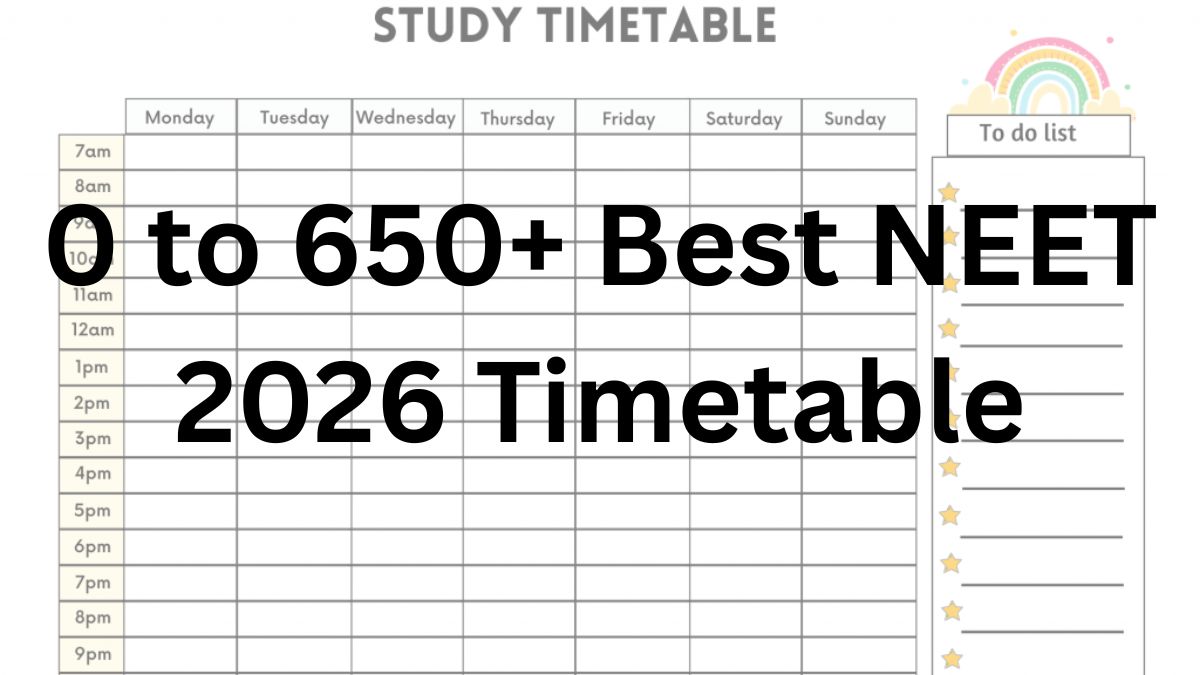The National Eligibility cum Entrance Test, Undergraduate (NEET UG) is a national level entrance examination condcuted every year by the National Testing Agency with the objective to shortlist and recruit eligible students for admission in the medical courses like MBBS, BDS, etc., at all the medical institutions like AIIMS, JIPMER, etc.
Every year, more than 20 lakh students register and appear for this national-level examination, making the level of competition very high; therefore, it is required that the students must start preparing early for this exam, and that too by following a dedicated timetable. Hence, in the article below, we are sharing an ultimate study plan that can help students achieve their goal.
0 to 650+ Best NEET 2026 Timetable
The best NEET Timetable isn’t something that covers all your subjects and provides a perfect balance, but the one that provides enough time to the students to adjust more time for their week zones while learning new topics. A perfect and best NEET 2026 Timetable must:
- Supports a balanced approach to mastering each subject.
- Eases stress by breaking down difficult topics into manageable sections.
- Enhances focus and concentration during study sessions.
- Ensures regular revision and practice, which are crucial for retaining what you’ve learned.
Key Factors of Best NEET 2026 Timetable
Students, while preparing the NEET 2026 Timetable, need to focus on multiple factors like understanding the NEET 2026 syllabus, daily targets, weekly objectives, etc. Hence, we have enlisted and detailed some of the key factors to be looked upon while crafting the Best NEET 2026 Timetable:
1. Understand the NEET 2026 Syllabus
Before you create your study plan, thoroughly understand the NEET 2026 syllabus. The NEET syllabus includes topics from Physics, Chemistry, and Biology (Botany and Zoology). Each subject has its weightage and level of complexity, so it’s crucial to prioritize the most challenging subjects.
-
Physics: Focus on concepts in Mechanics, Electricity, Magnetism, and Modern Physics.
-
Chemistry: Divide your time between Physical Chemistry, Organic Chemistry, and Inorganic Chemistry.
-
Biology: Prioritize topics such as Human Physiology, Genetics, and Ecology.
2. Divide Time Based on Difficulty Level
Students need to understand that the NEET Syllabus comprises topics that may be difficult to learn and will demand more time, while some of the topics will be comparatively easy and can be learned in one go. Therefore, it is important to highlight such topics and:
-
Difficult Subjects: Allocate longer study hours for tough subjects like Physics or Organic Chemistry.
-
Easier Subjects: Reserve shorter, consistent sessions for subjects you are comfortable with, such as Biology.
3. Daily Time Table for NEET 2026
Below we have shared an example of how a perfect NEET 2026 timetable can look. Students can take inspiration from this and create their own study timetable:
-
Morning Session (4-5 hours):
-
6:00 AM to 9:00 AM – Start with Biology or Chemistry (Subjects requiring memorization and clarity).
-
9:00 AM to 9:30 AM – Short break (Hydrate, stretch, relax).
-
-
Mid-Morning Session (3-4 hours):
-
9:30 AM to 12:30 PM – Physics (Concepts that require problem-solving and calculations).
-
12:30 PM to 1:00 PM – Short break.
-
-
Afternoon Session (3-4 hours):
-
1:00 PM to 4:00 PM – Revise and take mock tests for topics studied earlier.
-
4:00 PM to 4:30 PM – Lunch and relaxation.
-
-
Evening Session (2-3 hours):
-
4:30 PM to 6:30 PM – Focus on practicing sample papers and NEET mock tests.
-
6:30 PM to 7:00 PM – Break and light exercise.
-
-
Night Session (1-2 hours):
-
7:00 PM to 8:30 PM – Light revision, note-making, or video lessons for tough concepts.
-
8:30 PM – Wind up the day.
-
4. Weekly Timetable for NEET 2026
-
Monday to Friday: Follow your daily timetable rigorously, ensuring that you alternate between subjects and dedicate time to each subject evenly.
-
Saturday: Revise the week’s content, work on weak areas, and take a full-length mock test to gauge your progress.
-
Sunday: Take a break or engage in light revision and relaxation activities to rejuvenate.
5. Balancing Study and Relaxation
While focusing on studies, remember to incorporate regular breaks to maintain mental clarity. The Pomodoro technique—study for 25 minutes and take a 5-minute break—can enhance concentration and prevent burnout. Make sure to get enough sleep, exercise, and leisure time to stay refreshed and motivated.
Monthly Revision Schedule
Here’s the Monthly Revision Schedule in simpler terms:
-
End of Month 1-2: Go over everything you’ve learned so far. Focus on topics you find difficult.
-
End of Month 3-4: Start taking full-length mock tests. Look at your results to see where you can improve.
-
End of Month 5-6: Begin heavy revision. Review all subjects, especially the important and high-scoring chapters.
-
End of Month 7-8: Practice solving questions similar to NEET questions to get better at applying what you know.
-
End of Month 9-10: Revise the entire syllabus, focusing more on the topics you struggle with.
-
End of Month 11: Take several mock tests and practice exams to test your readiness and improve time management.
Tips for Scoring 650+ in NEET 2026
Achieving a score of 650+ requires dedication, hard work, and the right strategy. Here are some expert tips to help you:
-
Stay Consistent: Consistency is key. Stick to your timetable without skipping study sessions. Consistent study habits build your knowledge and confidence over time.
-
Practice Regularly: NEET is not just about theoretical knowledge. Practicing previous years’ papers, mock tests, and solving numerical problems is crucial for a high score.
-
Focus on Weak Areas: Identify your weak subjects or topics and dedicate extra time to them. Whether it’s organic chemistry or physics, ensure you have a strong grasp on every subject.
-
Use NCERT Books: NCERT books are a must for NEET preparation, especially for Biology and Chemistry. Ensure you complete every chapter thoroughly and refer to standard NEET books for Physics.
-
Revise Frequently: Regular revision is essential to retaining what you’ve learned. Allocate specific time slots for revision each week.
-
Stay Positive and Motivated: Keep a positive attitude throughout your preparation. A strong mindset will help you overcome any challenges and stay motivated until exam day.



 NEET 2026 Syllabus: Subject-Wise Topics,...
NEET 2026 Syllabus: Subject-Wise Topics,...
 NEET PG Scorecard 2025 Out, Check Direct...
NEET PG Scorecard 2025 Out, Check Direct...
 NEET Round 1 Seat Allotment 2025 Release...
NEET Round 1 Seat Allotment 2025 Release...








